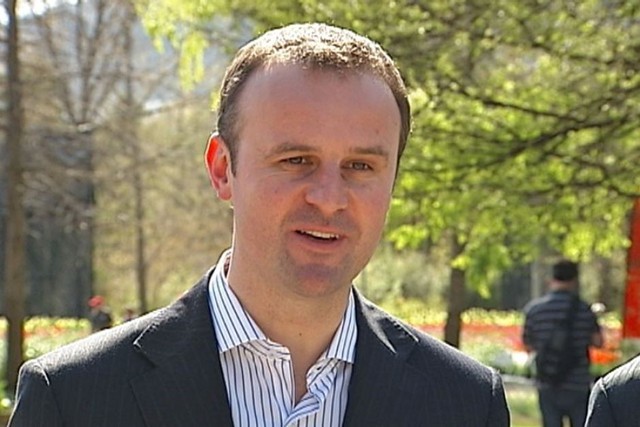It’s been promoted as a way of boosting the economy of a city under threat by its major employer cutting jobs: legalise same-sex marriage in Canberra and promote the ACT as a wedding destination for gays and lesbian couples from around Australia.
The idea horrifies some supporters of the traditional view that marriage can be between only a man and a woman. But Deputy Chief Minister Andrew Barr has made no secret of the fact that he sees commercial opportunities from the territory becoming among the first jurisdictions to legislate for what supporters term “marriage equality”.
Barr, who is gay, primarily supports same-sex marriage because he believes it is a human right. And he would happily forgo the extra wedding tourist dollars if the federal Marriage Act was amended to allow same-sex marriage throughout Australia.
Introducing same-sex marriage at the state and territory level has been seen as a fall-back position for marriage equality advocates in case they can’t get change federally.
Prime Minister Kevin Rudd’s promise to hold a fresh debate on same-sex marriage in Federal Parliament if Labor is returned to office has given some hope to marriage equality supporters. But even if Rudd wins another term as Prime Minister, he may struggle to get the numbers needed to amend the Marriage Act.
Labor has a conscience vote on gay marriage and some of the party’s MPs and senators strongly oppose changing the Marriage Act.
Barr believes Rudd would probably need to win the support of some non-Labor MPs to get the measure through.
Liberal leader Tony Abbott has reaffirmed his opposition to same-sex marriage and his party does not have a conscience vote on the issue. Technically, Liberal backbenchers can cross the floor on any matter. But in practice this rarely happens.
Unless the Liberal Party formally allowed its members a conscience vote, the Marriage Act would probably stay as it is.
So regardless of whether Australia is led by Rudd or Abbott, the marriage equality issue could remain on the agenda in some state and territory parliaments.
Tasmanian Labor Premier Lara Giddings has so far failed to get a same-sex marriage bill through her state’s Parliament but hasn’t given up. NSW Liberal Premier Barry O’Farrell will also consider introducing a same-sex marriage bill in his state.
For its part, the ACT government will introduce a same-sex marriage bill into the Legislative Assembly during the spring session.
The bill is likely to be approved by the 17-member chamber. All eight Labor MLAs and Greens Minister Shane Rattenbury are likely to vote for it. But the eight Liberal MLAs will all probably vote no; although some may be sympathetic to the idea of gay marriage, their public line has been that marriage is a federal, not a state or territory, issue.
Attorney-General Simon Corbell has legal advice that the ACT has the power to legislate for same-sex marriage. But a gay marriage law would inevitably be challenged in court.
An ACT gay marriage bill could also face a federal veto.
In the past, territory laws could be disallowed by the federal government.
But under amendments to the Self-Government Act passed in 2011, a vote in both houses of federal Parliament is needed to strike down ACT laws.
The ACT government is hoping for “safety in numbers”. If at least one state (which was immune from a federal veto) legalised gay marriage, the federal Parliament might be reluctant to stop the ACT from doing the same thing.
The approach the Federal Parliament takes to the same-sex marriage issue will be decided in large part by who the voters elect on September 7.
Peter Jean is chief assembly reporter
Author: Peter Jean
Publication: The Canberra Times
Date: 17 August 2013

